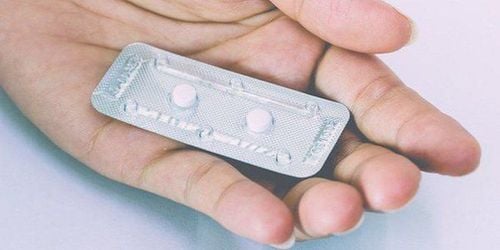This is an automatically translated article.
Altavera is a combination oral contraceptive containing two main ingredients, levonorgestrel and ethinyl estradiol. Correct use of altavera helps prevent pregnancy.1. What is altavera?
Altavera (main active ingredient: levonorgestrel and ethinyl estradiol) is a combined oral contraceptive (COC) pill consisting of 21 active tablets, each containing 0.15 mg levonorgestrel (a synthetic progestin) and 30 mcg ethinyl estradiol (an estrogen) and 7 placebo pills (non-hormonal).Oral contraceptives usually contain two hormones, estrogen and progestin, which, when taken correctly, prevent pregnancy. It works by preventing an egg from being released each month. Although birth control pills have other effects, contraception is the main effect. Sometimes eggs can still develop despite once-daily dosing, especially when more than 24 hours between two doses. In most cases when the pill is taken properly and an egg develops, it is still possible to prevent fertilization with birth control pills. This is because birth control pills also thicken cervical mucus, making it difficult for sperm to reach an egg.
In addition, birth control pills change the lining of the uterus, making it difficult for a fertilized egg to implant in the uterus to develop. All of these effects make it difficult for you to get pregnant when you take the Pill correctly.

Thuốc Altavera giúp làm giảm mất máu và đau bụng kinh
2. What diseases does Altavera treat?
Altavera is indicated for use in women of childbearing potential to prevent pregnancy. Besides preventing pregnancy, birth control pills can help make your periods more regular, reduce blood loss and menstrual cramps, reduce the risk of ovarian cysts, and can also treat acne. It should be noted, however, that using this medicine does not protect you or your partner against sexually transmitted diseases (such as HIV, gonorrhea, chlamydia).
3. How to take Altavera
Since pills usually contain 21 active pills and 7 placebo pills, you need to take one active pill (with hormones) once daily for 21 consecutive days. If you're taking the 28-pill product, you'd take 21 hormone pills, then take another 7 placebo pills for the next 7 days. You will get your period in the fourth week of your cycle. After you have taken the last placebo pill in the pack or have passed 7 days without taking the active pill, start a new pack the next day whether you have your period or not. If you do not have periods, consult your doctor.
If this is your first time using this medicine and you are not switching from another form of hormonal birth control (such as the patch, another birth control pill), take the first pill in the pack on Sunday the first day after the start of your period or on the first day of your period. If your period starts on a Sunday, start taking this medicine that day.
Take the medicine once a day at a certain time of the day so that you can easily remember and avoid forgetting the medicine. Try to take your doses no more than 24 hours apart. It is very important to continue taking this medication exactly as prescribed by your doctor. With certain brands of birth control pills, the amount of estrogen and progestin in each active pill will be different at different times of the cycle.

Nếu bị nôn mửa khi dùng thuốc tránh thai bạn nên dùng thêm phương pháp ngừa thai dự phòng như chất diệt tinh trùng
Therefore, you must follow the instructions on the blister pack to find the first pill, start with the first pill in the pack and take them in the correct order. Different colored tablets in the same pack contain different amounts of hormones or a placebo (non-hormone tablets). The effectiveness of the drug will decrease if taken out of order. Do not skip any doses. Your chances of getting pregnant are higher if you forget to take your pill, start a new pack of pills, or take your pill at a different time of day than usual.
Vomiting or diarrhea can prevent your birth control pills from working properly. If you experience vomiting or diarrhea, you should use a backup method of birth control (such as condoms, spermicide). Take this medication with food to help prevent nausea that may occur during the first few weeks. Nausea usually goes away with continued use or if the medication is taken at bedtime.
When you start using birth control pills, your body will need at least 7 days to adjust before it can prevent pregnancy. You will need to use another method of birth control for at least 7 days. Some doctors recommend using an extra method of birth control during your first cycle (or 3 weeks) to ensure adequate protection. Ask your doctor or pharmacist about switching from other forms of hormonal birth control (such as the patch, other birth control pills) to this product.
4. Altavera side effects
Common side effects when taking Altavera are nausea, vomiting, headache, abdominal bloating, tightness in the chest, swelling in the ankles, feet (water retention) or weight change. Vaginal bleeding between periods or missed or irregular periods may occur, especially during the first few months of use. If you miss your period 2 times in a row (or 1 period is late because the medication hasn't been used correctly), contact your doctor for a pregnancy test.
Tell your doctor if you have ever had any unusual or allergic reaction to medicines in this class or to any other medicines.

Trong vài tháng đầu sử dụng thuốc Altavera có thể xuất hiện tình trạng chảy máu âm đạo giữa các kỳ kinh
5. Contraindications of the drug Altavera
Altavera is contraindicated in women with the following conditions:
High risk of arterial or venous thromboembolic diseases Current or history of breast cancer or other estrogen or progestin-sensitive cancers . Liver tumor, acute viral hepatitis, or severe cirrhosis (decompensation) Use of combination hepatitis C medicines containing ombitasvir/paritaprevir/ritonavir, with or without dasabuvir, due to the potential for elevation of liver enzymes ALT Undiagnosed abnormal uterine bleeding Pregnancy, as there is no reason to use combined oral contraceptives during pregnancy.
6. Drug interactions
Some products that may interact with this drug include: aromatase inhibitors (anastrozole, exemestane), ospemifene, tamoxifen, tizanidine, tranexamic acid, combination medicines used to treat chronic hepatitis C ( ombitasvir/paritaprevir/ritonavir with or without dasabuvir).
Some medications can make hormonal birth control less effective by reducing the amount of reproductive hormones in your body. Examples: griseofulvin, modafinil, rifamycins (such as rifampin, rifabutin), St. John's wort, medicines used to treat seizures (such as barbiturates, carbamazepine, felbamate, phenytoin, primidone, topiramate), HIV medicines (such as nelfinavir, nevirapine, ritonavir)...
This medicine may interfere with interfere with certain laboratory tests (eg, clotting factors, thyroid), may cause false test results. Make sure the lab technician and all your doctors know you use this medicine.

Khi sử dụng thuốc có thể gây ra kết quả xét nghiệm sai
7. Some notes when using Altavera
For pregnant women: Oral contraceptives are not recommended for use during pregnancy and should be discontinued if you become pregnant or think you may be pregnant. When you accidentally take birth control pills in early pregnancy, the fetus is usually fine. Women who are not breastfeeding can start taking birth control pills two weeks after giving birth. Lactation: Oral contraceptives pass into breast milk and may change or decrease the amount of breast milk. In addition, they can decrease a woman's ability to breastfeed for about 1 month, especially when the mother is only partially breastfeeding. Because the amount of hormone in low-dose birth control pills is so small, your doctor may let you start using them after you've been breastfeeding for a while. However, you may need to use another method of birth control or stop breastfeeding while taking the Pill. In short, no birth control method is 100% effective. Studies show that less than 1% of women who use birth control pills correctly get pregnant within the first year of use. Birth control methods such as surgery or not having sex are more effective. Using condoms, diaphragms, progestin-only birth control pills, or spermicides have been shown to be less effective than using birth control pills that contain estrogen and progestin.
Please dial HOTLINE for more information or register for an appointment HERE. Download MyVinmec app to make appointments faster and to manage your bookings easily.
Reference source: webmd.com












